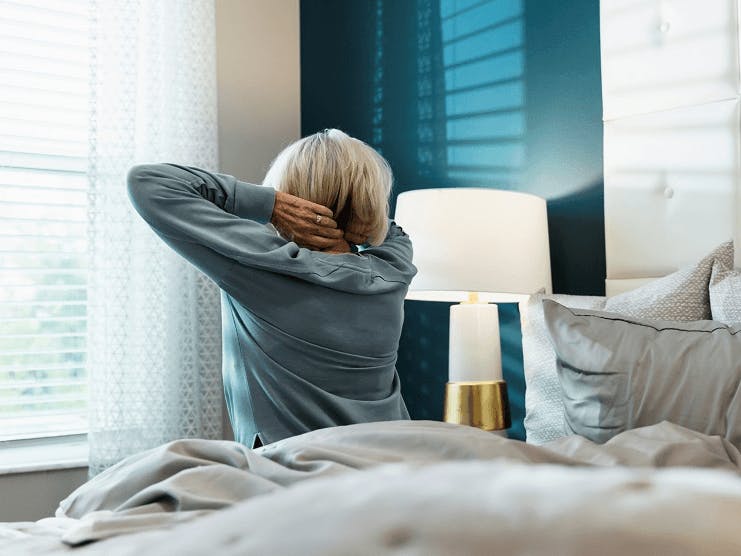
Staying up late can change your personality and hurt your ability to make good decisions. Here’s what you should know about sleep — including how to get more of it.
Say you stay up a couple of extra hours to finish a show you’ve been binge-watching. Or maybe you go to bed on time but struggle to fall asleep thanks to your late-afternoon cup of coffee. Either way, you’re probably doing more damage than you realize.
Just one night of lousy sleep can affect you in a big way. You’re more likely to be snappy with people around you and to crash your car, according to the Centers for Disease Control and Prevention (CDC).
But it can be hard to identify poor sleep as the problem. If you’re used to skimping on time in bed — logging only 5 or 6 hours a night, for instance — then you might not realize you’re chronically sleep-deprived, says Logan Schneider, MD. He’s a clinical assistant professor at the Stanford Sleep Medicine Center and clinical lead for sleep health at Alphabet Inc., both in Redwood City, California.
“The deficits accumulate slowly, and we don’t notice it in most cases,” says Dr. Schneider. “It’s the essence of a ‘slippery slope.’” In other words, you might be so used to feeling tired, you assume that’s just how you feel. You’ve forgotten what it’s like to be fully rested.
Researchers continue to learn more about the role of sleep, but one thing is clear: The more you get, the better you are at making decisions, forming relationships, and generally enjoying life. And because sleep helps fend off conditions such as heart disease, stroke, and type 2 diabetes, getting more of it can also give you more time on the planet.
If you’re not convinced, keep reading. These surprising sleep facts will make you a believer.
Related reading: Here’s how socializing can make your brain stronger.
1. Poor sleep leads to bad decisions
“When you’re sleep-deprived you’re not thinking straight,” explains Michael J. Breus, Ph.D. He’s board certified in clinical sleep disorders and the founder of TheSleepDoctor.com.
A study from the journal Annals of Neurology tested how sleep influences decision-making. In it, subjects slept just 5 hours each night. Then researchers had them complete decision-making exercises similar to gambling, which involved money and probability. The result: The more that people fell behind on sleep, the worse they became at analyzing risk and reward.
So if you’re not getting enough sleep, you’re more likely to make regrettable decisions, such as buying an expensive pair of shoes you can’t afford. Or you might climb a ladder that’s a little too wobbly or change lanes on the highway when it’s not safe.
2. Poor sleep makes your appetite hard to control
According to the Sleep Foundation, lack of sleep makes you more likely to crave unhealthy food and eat more calories than you need.
In a study from Northwestern University, researchers tested people after a normal night’s sleep and then again after they slept for only 4 hours. As predicted, the subjects ate more calorie-dense foods, such as cookies and potato chips, after the poor night’s sleep.
But what surprised the researchers was what they found upon testing the subjects’ blood after a night of poor sleep. There was a surge in brain chemicals called endocannabinoids, which are related to food cravings.
Endocannabinoids are chemically similar to the chemicals in marijuana that get you high. So in a way, skipping sleep gives you pot munchies.
3. Poor sleep makes it hard for you to get things done
In one study, researchers in Europe asked a group of software developers to stay awake for an entire night. The next day, they gave them a computer programming task. Compared with people who were rested, the sleep-deprived workers moved more slowly and made more mistakes. Overall, they were only half as good at their jobs.
That might be no surprise since the subjects stayed awake for an entire night. They were probably exhausted. But as it turns out, brainpower drains even with smaller levels of sleep deprivation.
Researchers from Australia’s University of Adelaide tested this. When they looked at men 65 and older, they found that those who spent less time in the deep stages of sleep had measurably lower levels of attention.
The lesson: If you don’t sleep well, you’ll probably struggle to check off items on your to-do list the next day. “Attention and focus go out the window,” says Dr. Breus.
4. Poor sleep makes you an emotional roller coaster
If you’re feeling uncharacteristically sad or angry, you might want to schedule an earlier bedtime. “All emotions are worse with lack of sleep,” explains Dr. Breus. “You can experience more depression, more anxiety, and just more problems in general.”
His point about anxiety is notable. According to the National Alliance on Mental Illness, the condition affects nearly 1 in 5 U.S. adults. And poor sleep is an anxiety trigger.
According to a small study from the University of California, Berkeley, staying up all night leads to a 30% spike in brain activity related to anxiety.
And if you’re wondering whether you can make up a long-running sleep debt with a couple of 10-hour nights, Dr. Schneider has an answer: No, you can’t. “Losing sleep over very long periods can never be recouped, so it suggests that our brains and bodies just take the hit,” he says.
Related reading: 6 Ways Your Body Changes When You Walk for 30 Minutes a Day.
How to become a deeper sleeper
Many people assume they’re just bad at sleep. But that’s probably not the case. Odds are, you just have bad sleep habits, says Dr. Breus. Here are five things he recommends you do for deep, restorative sleep every night.
Cut yourself off from caffeine at 2 p.m.
You know that caffeine is a stimulant. But you might not be aware of how long it stays in your body. The half-life of caffeine inside the human body can be up to 7 hours, according to a paper published in the journal Frontiers in Psychology.
That means if you drink a big cup of coffee with 300 mg of caffeine at 3 p.m., you could still have 150 mg in your body at 10 p.m.
Stop drinking alcohol at least 3 hours before bed
Some people use a cocktail or glass of wine to fall asleep faster, but it’s a bad strategy. According to the Sleep Foundation, alcohol throws off your sleep cycle and robs you of the most restorative stages.
As with caffeine, give yourself a strict “last call” for booze. Then stick to it.
Exercise daily, but not too close to bedtime
According to the Cleveland Clinic, routine exercise can reduce stress and tire your body. To increase sleep, it can be as effective as medication.
But one small word of caution: For some people, working out too closely to bedtime can stimulate them too much to fall asleep, says Dr. Breus. If you notice this, don’t give up on exercise. Just move your workout earlier. (Here’s how to start lifting weights if you’re over 60.)
Go to bed and wake up at the same time every day
Consistency is good for you. When Harvard researchers followed a group of adults for 7 days, they found that every additional hour of sleep variability (how much the sleep routine changed from night to night) increased the odds of metabolic syndrome by 23%. Metabolic syndrome is an indicator of prediabetes.
Dr. Breus recommends picking your ideal wake-up time and sticking to it. Then work backward to figure out what time you should go to bed. According to the CDC, adults need at least 7 hours of sleep a night. Be sure to give yourself extra time so that you don’t feel rushed to fall asleep as soon as you lie down.
Make your bedroom a sleep sanctuary
Dr. Breus recommends splurging for a comfortable mattress. Then make sure your room is dark, quiet, and cool. According to the Sleep Foundation, the best temperature for sleep is 60 to 67 degrees Fahrenheit.
Once you’ve dialed in your sleep routine, you might notice higher levels of energy, focus, and self-control during the day. That’s not your imagination. Your brain is getting stronger — and rest assured that sleep is the reason.
Additional resources
One night of impaired sleep
External Website Link
“Insufficient sleep: Enhanced risk-seeking relates to low local sleep intensity”
External Website Link
Sleep and overeating
External Website Link
“Olfactory connectivity mediates sleep-dependent food choices in humans”
External Website Link
Mental health stats
External Website Link
“Overanxious and underslept”
External Website Link
“The Safety of Ingested Caffeine: A Comprehensive Review”
External Website Link
Alcohol and sleep
External Website Link
Exercise and Sleep
External Website Link


